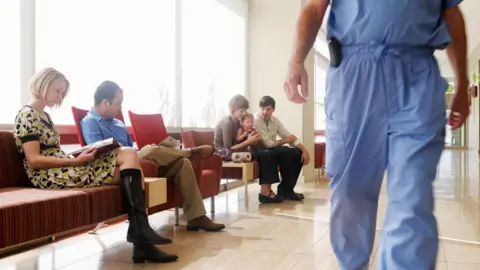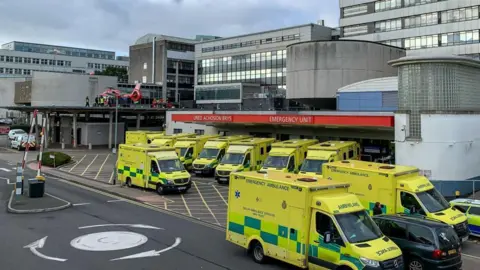Treatment wait times up despite extra NHS funding
 Getty Images
Getty ImagesMonthly waiting times in Wales have risen again on the day the Welsh government announced an extra £120m to reduce them.
The number of people waiting more than two years for treatment rose to more than 9,600 patients, up from about 8,400 last month.
Statistics Wales said there had been changes into what was included in the date but there were about 789,900 waiting to start treatment in total, and an increase of about 1,100 pathways waiting when accounting for the changes.
The Welsh government said the bulk of those waits were in north Wales and suggested the Easter break would have impacted the figures.
Health Secretary Jeremy Miles, said: "It is disappointing to see the increase in long waits in April after all the progress health boards have made over the last few months.
"However, this is an annual trend seen in April in Wales and also the other UK nations.
"This is why we are making changes to how the NHS provides planned care and are investing £120m to bring down waiting times this year.
"We're asking people to do all they can to support the NHS by keeping their appointment and making sure they are fit and ready for treatment."
The Welsh government said the extra funding would reduce the overall waiting list by 200,000, eliminate all two-year waits and reduce diagnostic waiting times to under eight weeks by March.
While diagnostic waiting times have been gradually falling, this month showed an increase and stands at 38,500 waiting longer than eight weeks.
In a statement, Welsh government said the money would provide more outpatient appointments, more diagnostic tests and more treatments, including more than 20,000 cataract operations.
Health boards will also be expected to improve productivity and efficiency, to reduce the variation seen across Wales.
That will include reducing the number of automatic follow-up appointments, with patients instead asked to arrange them only if they are needed.
The latest figures also show a worsening picture in cancer performance, dropping to 60.5% of patients starting treatment within 62 days of the suspicion of cancer.
There was also an increase in daily attendances to A&E, though performance against the four and 12-hour targets dipped.
Ambulance response times also slightly worsened, though next month changes will be brought in to the targets, with an emphasis on patient outcomes rather than response times.
 Getty Images
Getty ImagesJames Evans, Welsh Conservative health spokesman, described the health strategy as "progress in reverse".
He added: "You need a substantial workforce plan, you need a cancer action plan and you need a whole-of government approach."
Welsh Liberal Democrats leader Jane Dodds said: "Confidence in the NHS is low, confidence in the Welsh Labour government is low, and the only thing that isn't low is the number of people waiting for treatment."
